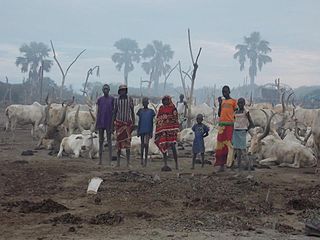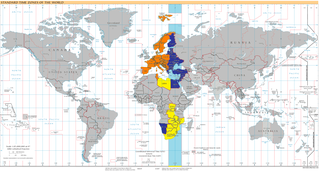
Khartoum or Khartum is the capital of Sudan. With a population of 5,274,321, its metropolitan area is the largest in Sudan, the sixth-largest in Africa, the second-largest in North Africa, and the fourth-largest in the Arab world. Khartoum is located at the confluence of the White Nile, flowing north from Lake Victoria, and the Blue Nile, flowing west from Lake Tana in Ethiopia. The location where the two Niles meet is known as al-Mogran or al-Muqran. From there, the Nile continues to flow north towards Egypt and the Mediterranean Sea.

Port Sudan is a port city in eastern Sudan, and the capital of the state of Red Sea. As of 2007, it has 489,725 residents. Located on the Red Sea, it is the Republic of Sudan's main port city.

The Lord's Resistance Army insurgency is an ongoing guerrilla campaign waged by the Lord's Resistance Army (LRA) insurgent group since 1987. Currently, there is low-level LRA activity in eastern Democratic Republic of the Congo and the Central African Republic. The movement is led by Joseph Kony, who proclaims himself the "spokesperson" of God and a spirit medium. It aims to overthrow Yoweri Museveni's Ugandan government and establish a theocratic state based on the Ten Commandments and Acholi tradition.

Darfur is a region in western Sudan. Dār is an Arabic word meaning "home [of]" – the region was named Dardaju while ruled by the Daju, who migrated from Meroë c. 350 AD, and it was then renamed Dartunjur when the Tunjur ruled the area. Darfur was an independent sultanate for several hundred years until it was incorporated into Sudan by Anglo-Egyptian forces in 1916. The region is divided into five federal states: Central Darfur, East Darfur, North Darfur, South Darfur and West Darfur. Because of the war in Darfur between Sudanese government forces and the indigenous population, the region has been in a state of humanitarian emergency since 2003.

Rumbek is the capital of Lakes State, central South Sudan, and the former capital of the country.

UTC+02:00 is an identifier for a time offset from UTC of +02:00. In ISO 8601, the associated time would be written as 2019-02-07T23:28:34+02:00. This time is used in:
Zoran Đorđević is a Serbian international football manager. During the 40-years career, he coached many national and first-league teams across Asia and Africa.

The coat of arms of the Republic of South Sudan was adopted in July 2011 following independence from the Republic of Sudan. Prior to independence, South Sudan was an autonomous region of Sudan.

Sudan sent a delegation to compete at the 2008 Summer Olympics in Beijing, China. Nine competitors, all from the Darfur region and northern Sudan, represented Sudan at the Beijing games.
The Enough Project is a Washington, D.C. based non-profit organization that was founded in 2007. Its stated mission is to end genocide and crimes against humanity. The Enough Project conducts research in several conflict areas in Africa including Sudan, South Sudan, the Democratic Republic of the Congo, the Central African Republic, and the areas controlled by the Lord's Resistance Army (LRA). The Enough Project seeks to build leverage against the perpetrators and facilitators of atrocities and corruption through conducting research, engaging with governments and the private sector on policy solutions, and mobilizing public campaigns. Campaigns and initiatives aimed to bring attention to these crises include The Sentry and, previously, Raise Hope for Congo and the Satellite Sentinel Project.

The Southern Sudan Autonomous Region was an autonomous region that existed in Southern Sudan between 1972 and 1983. It was established on 28 February 1972 by the Addis Ababa Agreement which ended the First Sudanese Civil War. The region was abolished on 5 June 1983 by the administration of Sudanese President Gaafar Nimeiry. Revocation of southern autonomy was one of the causes of the Second Sudanese Civil War which would continue until January 2005, when southern autonomy was restored.

The States of South Sudan were created out of the three historic former provinces of Bahr el Ghazal (northwest), Equatoria (southern), and Greater Upper Nile (northeast). The states are further divided into 180 counties.
The sport of football in the country of Sudan is run by the Sudan Football Association. The association administers the national football team, as well as the Premier League. Football is the most popular sport in Sudan.

The foreign relations of South Sudan are the relations between the Republic of South Sudan and sovereign states and international organizations. The establishment of the relationships followed the formation of the South Sudanese state on 9 July 2011. South Sudan's former parent country Sudan became the first state in the world to recognize South Sudan.

South Sudan, officially known as the Republic of South Sudan, is a landlocked country in East-Central Africa. It is bordered to the east by Ethiopia, to the north by Sudan, to the west by the Central African Republic, to the south-west by Democratic Republic of the Congo, to the south by Uganda and to the south east by Kenya.

The economy of South Sudan is one of the world's weakest and most underdeveloped. South Sudan has little existing infrastructure and has the highest maternal mortality and female illiteracy rates in the world as of 2011.

Four Independent Olympic Athletes competed at the 2012 Summer Olympics in London, the United Kingdom. These were athletes from the former Netherlands Antilles, and from the newly formed state of South Sudan. This was the third time that athletes had competed as independent participants in the Olympics. None of the athletes won an Olympic medal.
The sport of football in the country of South Sudan is run by the South Sudan Football Association. The association administers the national football team, as well as the Football Championship. Football is the most popular sport in South Sudan.
In late 2012, a yellow fever outbreak occurred in the Darfur region of Sudan that was the largest yellow fever epidemic to strike Africa in two decades. On 10 January 2013, the Sudan Federal Ministry of Health and the World Heath Organization (WHO) reported that there had been 847 suspected cases since 2 September 2012, including 171 deaths, for an estimated case fatality rate of 20%. A mass vaccination campaign was launched in mid-November. By early January, the five states of Darfur were free of any new cases.












